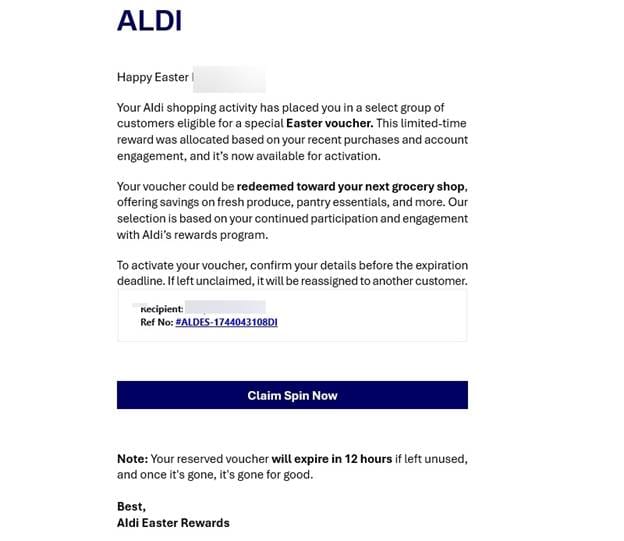Easter-Themed Scams: How Cybercriminals Are Cracking Their Way Into Your Inbox

Cybercriminals waste no time leveraging popular holidays to trick unsuspecting victims—and Easter is no exception. Bitdefender Antispam Lab has identified a surge in Easter-themed spam emails crafted to steal sensitive information, payment details, or both. Although many messages look legitimate, they come with malicious intentions hidden behind cheerful subject lines referencing eggs, chocolate baskets, and exclusive holiday discounts.
Note: All product and company names mentioned herein are for identification purposes only and are the property of, and may be trademarks of, their respective owners.
Legitimate Promos vs. Holiday Scams
During Easter, it’s normal to see promotions from trusted retailers or well-established brands offering festive deals that range from discount codes to themed merchandise. Cybercriminals know that inboxes are brimming with such legitimate marketing materials, so they take advantage of this predictable surge in brand outreach. They mimic the logos, layouts, and tone of respected companies to slip under the radar, making it harder for recipients to distinguish real offers from scams.
It’s crucial to keep in mind that conventional marketing emails aren’t inherently problematic; they may simply advertise a legitimate discount or remind customers of new arrivals. The real issue is the fraudulent campaigns that piggyback on the flood of genuine offers, aiming to steal personal info or financial details. Recognizing how these scams blend in with genuine messages is the first step toward protecting yourself.
Real-World Easter Scam Examples
According to Bitdefender Antispam Lab, here are some scam examples that have been observed popping up in inboxes across the world since March 24. Some of the top targets for Easter scams this year include recipients in the US, the UK, Ireland, Italy, Bulgaria, Australia, and South Africa.
‘Free Lindt Easter Hamper’ Emails
A very common Easter scam promises recipients a lavish Lindt Easter chocolate basket for simply filling out a short survey. However, those survey links lead to phishing forms designed to steal credit card data or other personal information.

Bogus Aldi Gift Cards & Easter Coupons
Under the subject “Aldi Easter Special – Claim Your Gift Card,” scammers steer unsuspecting victims to bogus coupon portals. These sites appear authentic at a quick glance but are crafted solely to gather sensitive information from users, such as login credentials and payment details, under the false pretense of receiving exclusive store vouchers.

Bogus Facebook Easter Gift
Scammers also targeted internet users' inboxes, promising them gifts, including cash prizes and a Mercedes-Benz. The message clearly states that no payments are required to claim the gifts. Recipients are prompted to access an Excel attachment to select their prize. After accessing the document, users are prompted to enter their login details, ultimately enabling the scammers behind the scenes to hijack accounts or commit identity theft.

Counterfeit E-Cards
Another popular scam theme this year comes in the form of personalized letters from the Easter Bunny – recipients are lured with the opportunity to send their children and grandchildren letters. While these look like friendly, festive greetings, they often redirect recipients to phishing pages disguised as legitimate e-card websites, where users unwittingly surrender sensitive data and money. In some cases, the links can also lead to webpages that serve up malware (credential-stealing trojans and spyware).

Brand Impersonations (Rituals, Cosmetics, etc.)
Another widespread tactic involves Easter-themed gift card giveaways. The scammers behind these messages replicate the look and feel of popular beauty or skincare brands, including official logos and design elements, to trick people into participating in bogus surveys that ultimately lead them to enter payment details to cover shipping costs.

Here’s a translation of a scam message received by internet users in the Netherlands:
“Win a Rituals gift card. Easter is approaching and spring is almost here! How do you celebrate Easter? Whether you enjoy a traditional family brunch, a relaxing weekend at home, or organize an adventurous Easter egg hunt, we would love to hear your story. Fill in our survey and have a chance to win one of the many Rituals gift cards. Be quick because gone=gone!”
How to protect against Easter scams
Closely inspect the sender and any embedded links
Double-check that the sender’s domain matches the official company URL. Hover over any linked text or buttons to verify that they lead to legitimate pages.
Use scam detection tools – free from Bitdefender
- Scamio: Helps identify known scam websites and tactics from any messages you receive, whether via email or instant messaging apps. If unsure about offers or proposals, ask Scamio for free on any device or operating system via your web browser or Facebook Messenger, WhatsApp and Discord.
- Link Checker: Quickly check for suspicious URLS and fraudulent or phishing website before you open them.
Be Wary of Attachments
Even a seemingly innocent Easter e-card can carry malicious software. When in doubt, avoid downloading or opening attachments from unknown senders.
Never Share Sensitive Data via Email
Trusted companies don’t typically ask for passwords, PINs, or credit card details via email. If you’re uncertain, directly visit the brand’s official website or contact customer support.
tags
Author
Alina is a history buff passionate about cybersecurity and anything sci-fi, advocating Bitdefender technologies and solutions. She spends most of her time between her two feline friends and traveling.
View all postsRight now Top posts
How to Protect Your WhatsApp from Hackers and Scammers – 8 Key Settings and Best Practices
April 03, 2025
Outpacing Cyberthreats: Bitdefender Together with Scuderia Ferrari HP in 2025
March 12, 2025
Streamjacking Scams On YouTube Leverage CS2 Pro Player Championships to Defraud Gamers
February 20, 2025
How to Identify and Protect Yourself from Gaming Laptop Scams
February 11, 2025
FOLLOW US ON SOCIAL MEDIA
You might also like
Bookmarks






